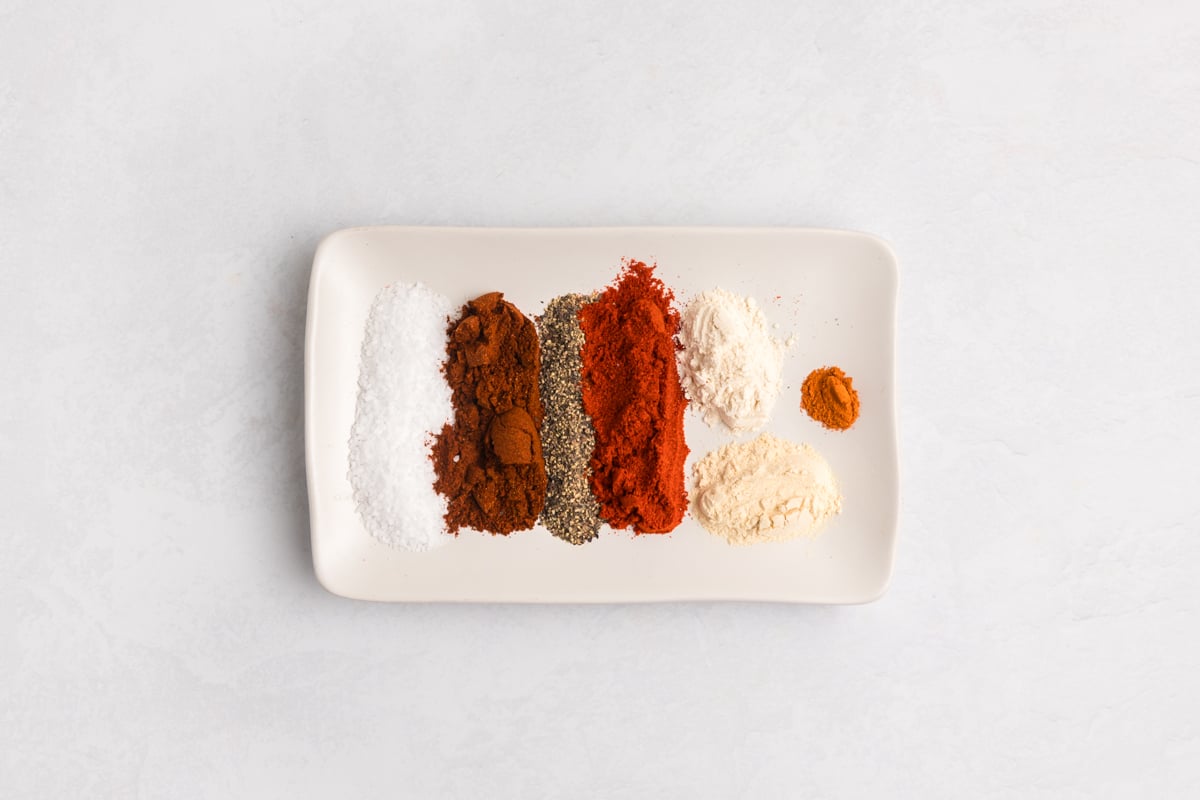This flavorful homemade turkey rub recipe is so simple and delicious, you’ll want to make it to put on everything! Make a big batch and store it in the pantry.
I like to think that there are a million ways to make the best turkey. We play around with our recipes every year and every year we declare the new one “the best”!
We’ve learned a lot, so there is all of that info. If you are bored and just want the recipe, there is a handy jump to recipe button right at the top that will skip all the important info.
The truth is, turkey is like a blank slate waiting to be seasoned and it is up to you, the culinary artist to make that happen. We developed this custom blend of spices to be used alongside either our turkey brine or turkey injection and the simple, 7-ingredient recipe has since gone bonkers.
Just read the comments… or look at how many other bloggers have managed to copy it, and you’ll know it is a winning recipe. The perfect ratios and blend of seasoning, smokiness and salt help being out the natural flavors of turkey and are enough as a standalone flavor, but also mild enough to pair with nearly any gravy or stuffing.
The drippings will be perfectly balanced and ready to use in gravy from drippings. The next bonus- it isn’t just limited to a whole bird. Use this custom spice blend on turkey breast, chicken, pork or even in burgers or on veggies.
Turkey can be a blank canvas when it comes to flavor. With its mild taste and texture, it benefits hugely from a flavor boost. This is where spices and herbs can really make the difference between a bland bird and a fantastically flavored feast!
When considering what spices to use on turkey, think about complementing and enhancing the natural flavor, rather than overpowering it. Here are the top spices and herbs to use, why they work so well, and how to use them to season your turkey to perfection.
The Essential Turkey Spices
These spices should form the base of any turkey seasoning blend.
Salt
Enhances flavor and helps crisp up the skin Kosher salt is ideal as its texture helps it adhere to the meat
Black Pepper
Freshly cracked pepper adds warmth.
Garlic Powder
Provides a punch of flavor.
Onion Powder
Adds savoriness.
Smoked Paprika
Subtle smokiness complements turkey.
Brown Sugar
A touch of sweetness to balance the savory.
Herbs for Turkey Seasoning
Fresh herbs are fantastic for seasoning turkey as they add vibrant flavor without being overpowering. Here are some of the best herbs to use:
Rosemary
Rosemary’s piney flavor is a perfect match for turkey. Use whole sprigs in the cavity or finely chop and add to seasoning rubs or herb butter.
Thyme
Thyme’s woodsy, delicate minty notes pair so well with poultry. Use sprigs in the cavity or chopped in rubs. Lemon thyme also works beautifully.
Sage
Sage’s peppery, slightly lemony flavor cuts through the richness of the turkey meat. Rubbed sage is best for seasoning.
Parsley
Fresh parsley brightens up the flavor profile. Flat leaf parsley has the most robust flavor.
Marjoram
Similar to oregano with a sweet pine and citrus flavor. Use at the end of cooking.
Savory
Savory has a peppery flavor that enhances the natural taste of turkey.
Tarragon
Tarragon’s licorice notes pair well with turkey.
How to Use Spices and Herbs on Turkey
There are several ways to use spices and herbs to add flavor to your turkey:
-
Dry Brine – A day or two before cooking, sprinkle the turkey all over with a salt-heavy spice rub. This seasons the meat and helps crisp the skin.
-
Herb Butter – Blend chopped herbs into soft butter with salt and pepper then rub under the skin and over the surface.
-
Cavity Stuffing – Stuff the cavity with herb sprigs, lemon, onion etc to infuse the interior.
-
Seasoning Mix – Make a blend using the essential spices, herbs, salt and pepper to rub on the outside.
-
Compound Butter – Whip herbs into room temperature butter to place slices under the skin.
-
Oil or Fat – Rub turkey with olive oil or butter before applying dry rub or herb butter to help them stick.
Helpful Tips for Seasoning Turkey
-
Make seasoning blends ahead of time so they’re ready when you need them. Store in an airtight container for 1-2 months.
-
For the most flavor impact, coat the turkey a day or two in advance.
-
Use dried herbs not fresh for longer shelf life. Dried thyme, rosemary and sage work great.
-
Reduce salt if using a salty brine or if you generally prefer less sodium.
-
For extra flavor, add spices like cayenne, nutmeg, cinnamon, chili powder or cumin.
-
Stuff the neck cavity too for even more interior flavor.
-
Truss the turkey to keep seasoning nicely adhered to the meat and ensure even cooking.
-
Roast your seasoned turkey low and slow for deliciously tender and juicy meat.
Sample Turkey Spice Blends
Everyday Turkey Rub
- 2 tsp dried thyme
- 2 tsp dried rosemary
- 2 tsp garlic powder
- 1 tbsp brown sugar
- 1 tbsp kosher salt
- 1 tsp onion powder
- 1 tsp smoked paprika
- 1 tsp cracked black pepper
Herby Turkey Seasoning
- 2 tsp dried sage
- 2 tsp dried marjoram
- 1 tbsp dried parsley
- 1 tsp dried lemon peel
- 1⁄2 tsp celery seed
- 1 tbsp kosher salt
- 2 tsp cracked black pepper
Citrus Turkey Spice Mix
- Zest of 1 orange
- Zest of 1 lemon
- 2 tsp garlic powder
- 2 tsp onion powder
- 1 tbsp brown sugar
- 2 tsp dried oregano
- 1 tbsp kosher salt
- 1 tsp cracked black pepper
Spicy Turkey Rub
- 1 tsp cayenne pepper
- 1 tsp chili powder
- 1 tsp paprika
- 1 tbsp light brown sugar
- 1 tbsp kosher salt
- 1 tsp onion powder
- 1 tsp garlic powder
- 1⁄2 tsp dry mustard
Herb Turkey Butter
- 1⁄2 cup unsalted butter, softened
- 2 tbsp chopped fresh sage
- 1 tbsp chopped fresh thyme
- 1 tbsp chopped fresh rosemary
- 1 clove garlic, minced
- 1⁄2 tsp kosher salt
- 1⁄4 tsp cracked black pepper
Using the right blend of spices and herbs can take your turkey from forgettable to fantastic. Stick with aromatics like garlic, onion and pepper then build on these with classic herb flavors like rosemary, thyme and sage. Finally, tailor your seasoning to your own taste with extras like citrus, spice or sweetness. Taking the time to perfectly season your turkey will ensure a flavorful feast.
Frequently Asked Questions
What should you season your turkey with?
Stick with salt and pepper, put herbs like rosemary, thyme, and sage to work, or take spicy Cajun seasoning for a spin for some kick. Whatever blend you choose, spread it all over the turkey—on top, underneath, between the body and wings and legs, under the skin, and even in the cavity of the bird.
What is best to stuff a turkey with for flavor?
Fresh herbs like thyme, rosemary, and sage along with a half lemon go a long way to add flavor, and stuffing it into the bird takes almost no time at all. (While you’re at it, season the cavity with a good amount of salt and pepper.) Brining is an essential step to ensure a juicy bird.
How do you add flavor to turkey?
Baste the turkey with fresh beer, wine or juice every hour. The natural sugars will help caramelize the outside of your turkey, giving it a nice crispy and flavorful skin. Injecting with butter or apple juice will add flavor, moisture and help penetrate down into the meat, which will make the turkey more flavorful.
How long does it take to cook a 12 lb turkey?
A general rule of thumb is that a 12 pound turkey will take about 3 hours to cook. For the most accurate cooking time, plan for 15 minutes per pound at 325°F. So a 12 pound turkey will take about 3 hours (12 lbs x 15 minutes per lb = 180 minutes or 3 hours).
Should you put water in the bottom of the pan when cooking a turkey?
It’s not necessary to add water to the roasting pan when cooking a turkey. The turkey will release its own juices and fat that will keep the bottom of the pan from burning or scorching. Adding water can actually cause the drippings to splatter, making a mess in your oven.
What is the best way to thaw a turkey?
The safest method is thawing in the refrigerator. Allow roughly 24 hours for every 4-5 pounds. For a 12-pound turkey, thaw for 3 days. You can quick thaw in cold water but this requires more monitoring. Change the water every 30 mins until thawed.
How long is a cooked turkey good for?
A cooked whole turkey is good for 3-4 days refrigerated. Carved turkey meat can last 3-4 days refrigerated and 2-3 months frozen when sealed properly in an airtight container. Reheat cooked turkey to 165°F.
Can you cook a turkey from frozen?
Yes, a turkey can be cooked directly from the frozen state without thawing first. Add 50% more cooking time and use a lower temperature like 325°F. Baste frequently with broth and cover with foil to prevent drying out. Test for doneness by taking the internal temperature in the breast and thigh.
With the right blend of aromatic spices, fresh herbs, salt, and pepper, you can transform your ordinary turkey into a delicious, juicy centerpiece for your next meal. Don’t be afraid to get creative and customize your own signature spice rub. Your tastebuds will thank you!

How Much Seasoning for Turkey?
Turkeys don’t come in nice, even weights and therefore you’ll need a different amount of seasoning for every single bird. The volume isn’t a perfect science, so don’t stress, just use this a basic jumping off point.
As for seasoning per pound, I like to use 1 1/2 tablespoon for every 3 pounds. This recipe makes 4 1/2 tablespoons and is good for a 10-14 pound turkey.
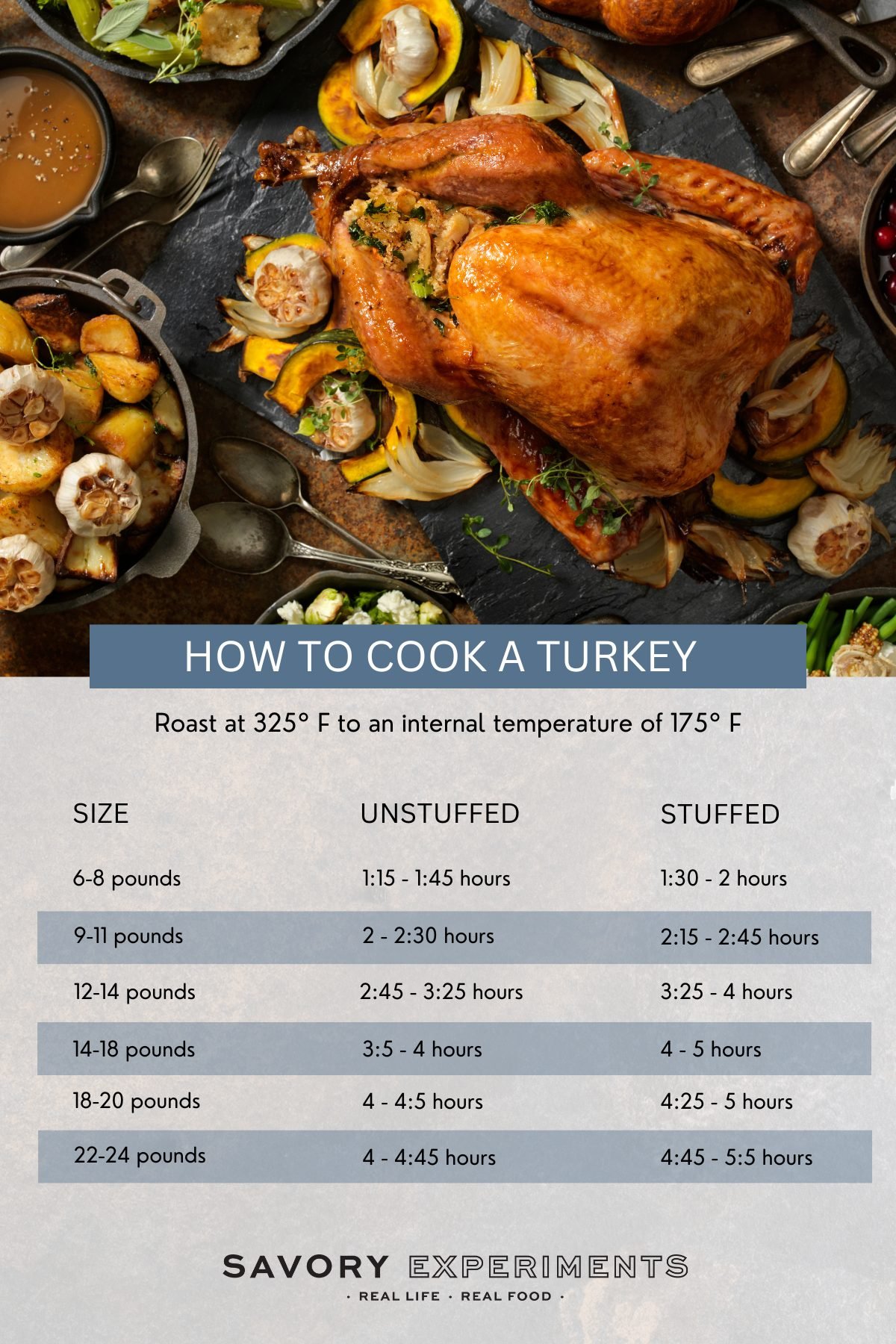
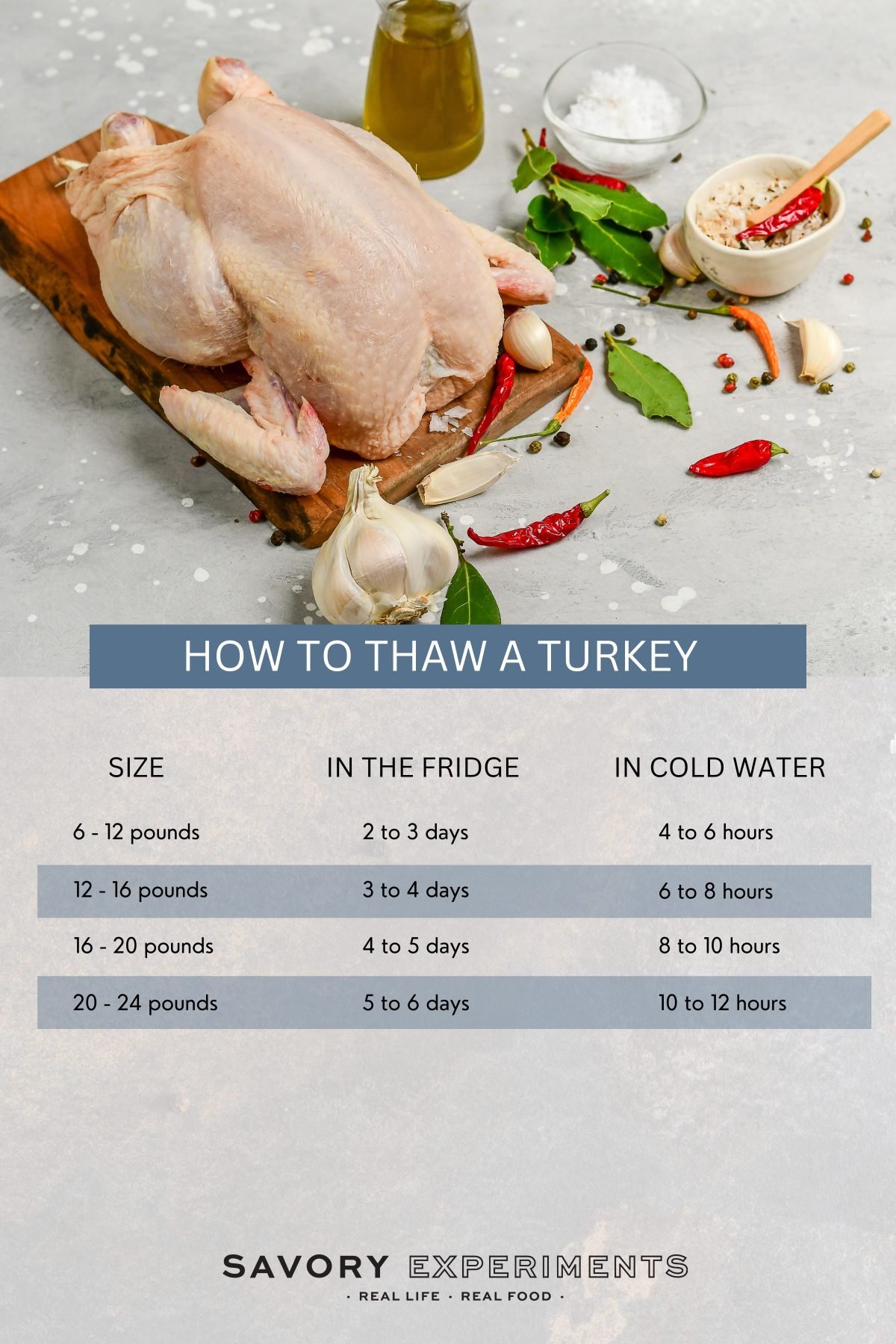
Someone in your family watching salt? Make a low-sodium turkey rub by dialing back the salt volume. The other ingredients will compensate for the lack of salt.
I also highly recommend using Kosher salt due to its large grain size, it ends up tasting less salty and sticks better.
Do not, under any circumstances use table salt. Iodized salt will make your bird taste metallic. It will also make your bird more salty since the grains are smaller, you end up getting a lot more salt.
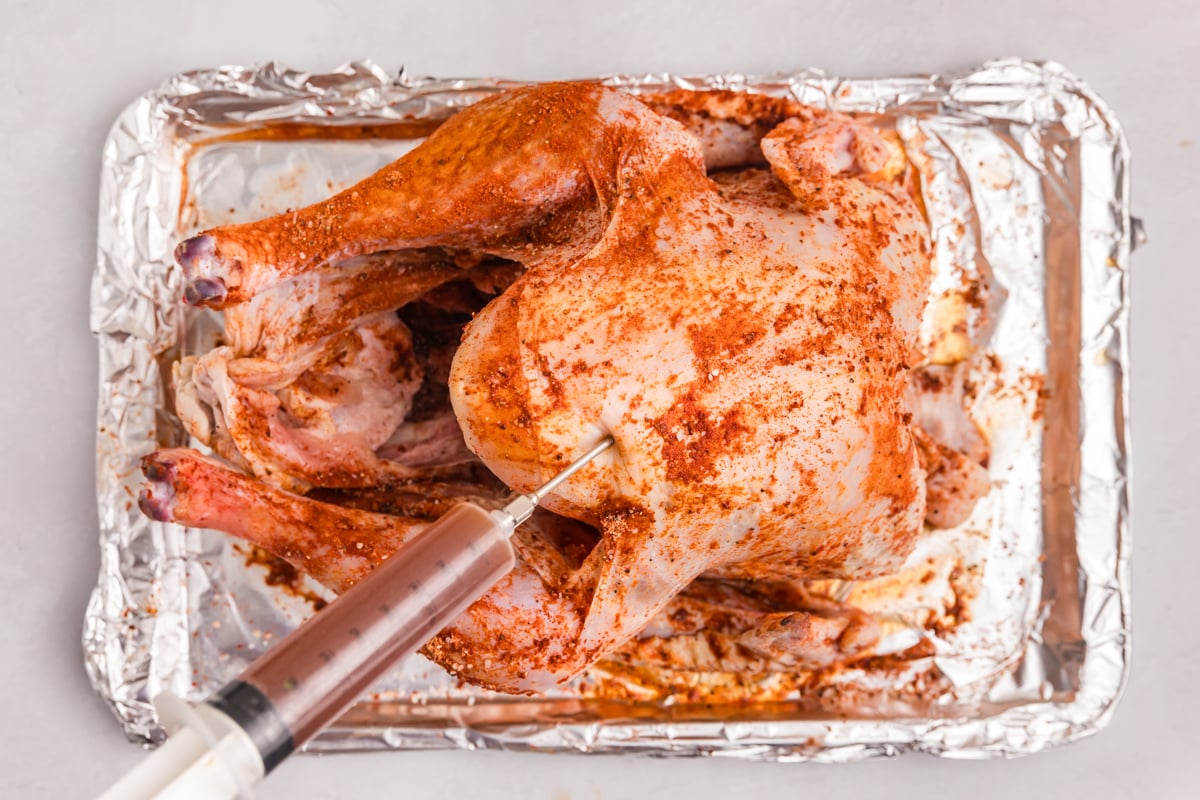
Like spice? Increase heat. You are getting the idea, right?
Spices for the perfect turkey can be cayenne pepper, crushed red pepper flakes or any chile powder. An ancho chile powder will give off a smoky flavor, while ghost pepper powder will make your nose run. It all depends on personal preference. My new favorite is aleppo pepper.
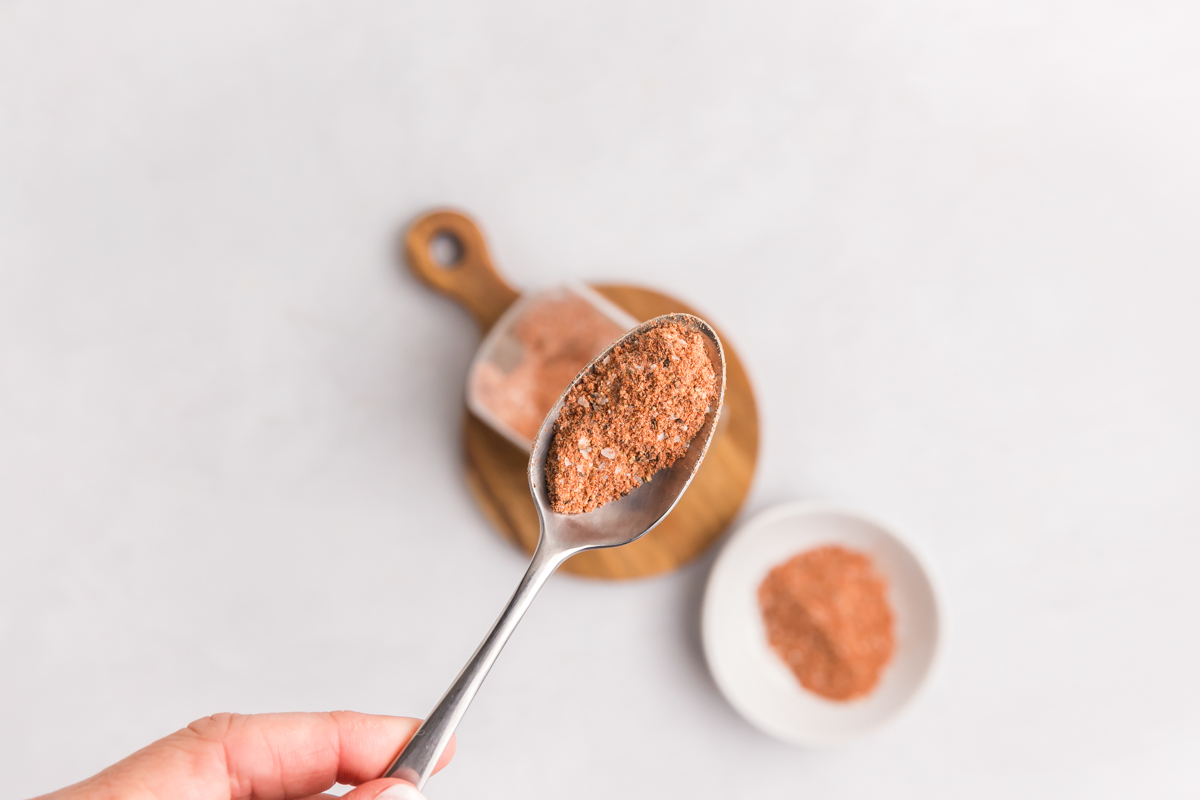
Use this simple seasoning mixture as a base and then come up with your own special blend. Here are a few more ideas. Remember that flaky dried herbs will have a higher chance of burning if you plan to fry your flavorful turkey. Be creative!
- Lemon Zest
- Orange Zest
- Coriander
- Celery Salt
- Fresh herbs
- Rosemary
- Sage
- Ground Cloves
- Thyme
- Parsley
- Tarragon
- Poultry Seasoning
- Herbs de Provence
- Nutmeg
- Allspice
- Ground ginger
- Ground cardamom
- Garam Masala
- Dried mushrooms (ground)
- Cinnamon
- Smoked salt
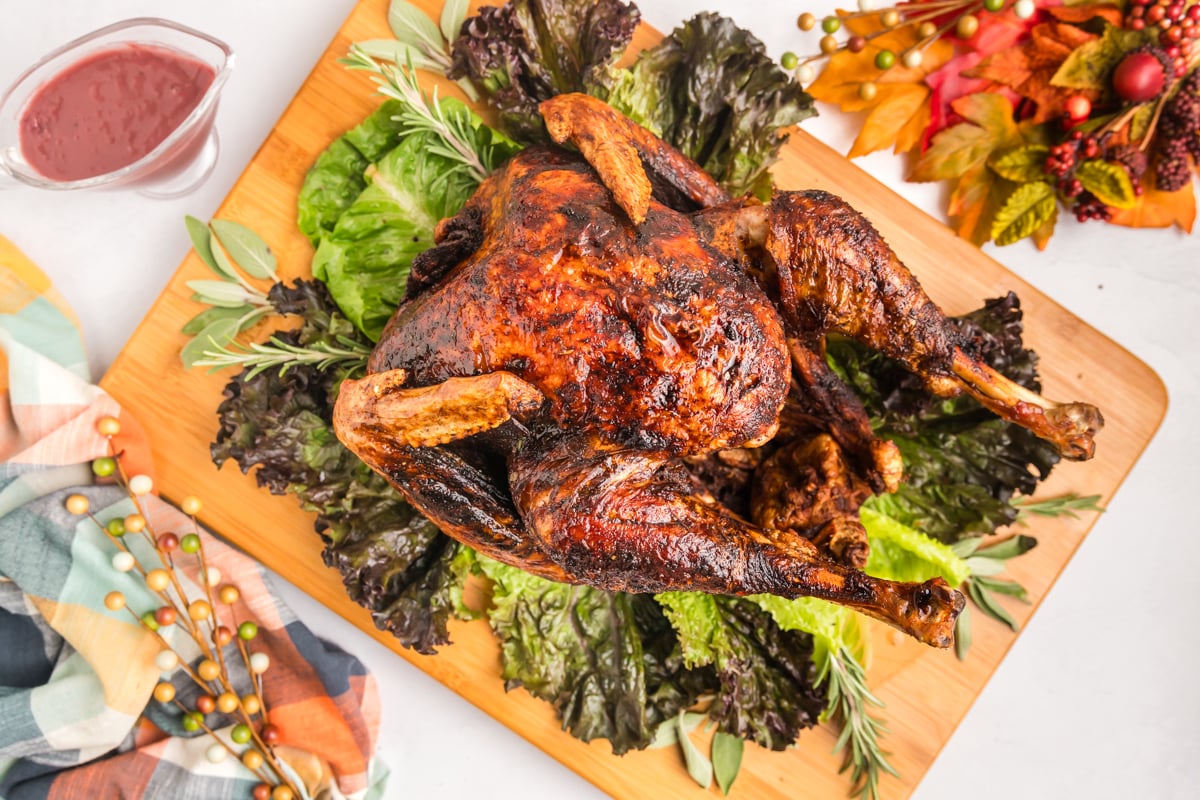
So… STOP… and take 3 minutes (yes THREE MINUTES) to make your own and save your $5.99. You won’t regret it! And then think of all the magical things you can spend your six bucks on.
- Mix together the savory flavors in a small bowl.
- Store until ready to use in an airtight container.
- Sleep well knowing you’ve just made the best seasoning.
After you make you make your own homemade turkey rub, you can smoke it, fry it, roast it or even air fry turkey! Yes, they just started making air fryers large enough for an entire turkey!
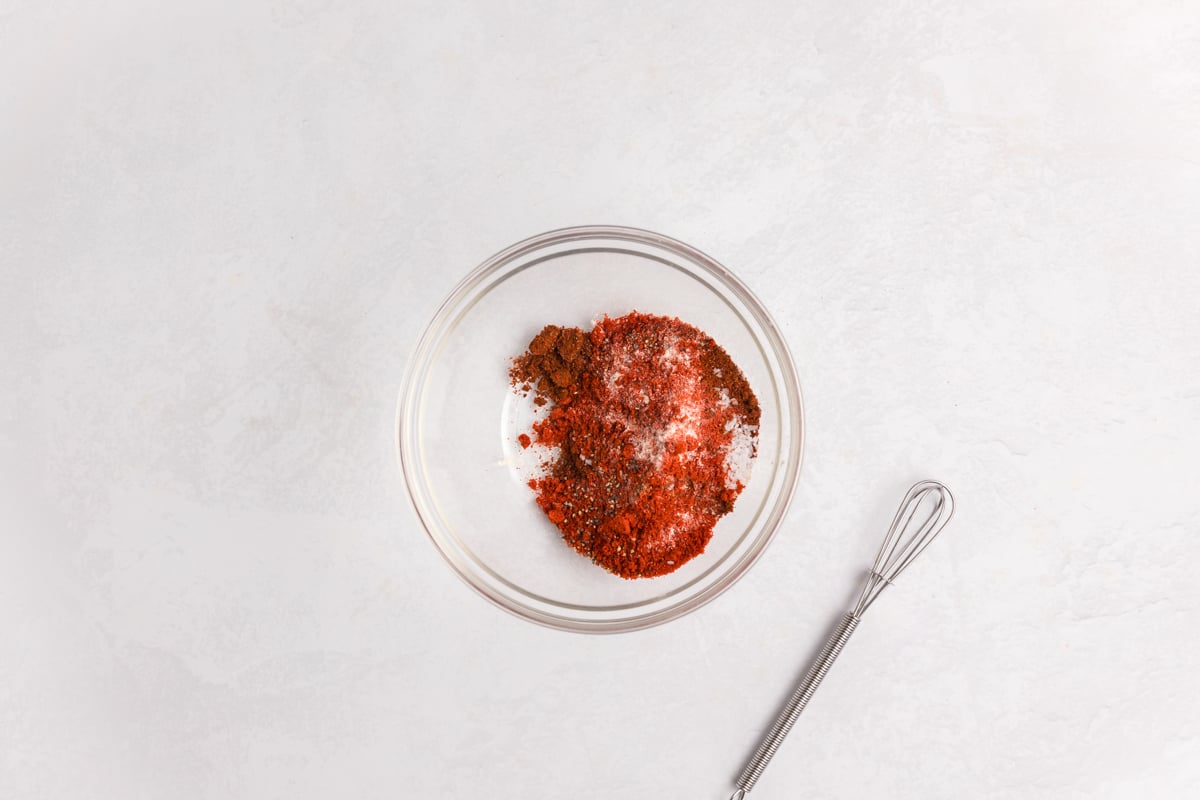
Turkey Rub vs. Turkey Dry Brine
Basically a turkey rub is perfect for the person who forgot to brine (dry brine or wet brine). Or maybe forgot to buy the overpriced, premade stuff at the store. Or the person who is making a turkey for the first time….
Dry brine is something you would put on a day or so in advance and is super salt heavy. Here is my basic dry brine for turkey recipe if you want to try those and have the time on your hands.
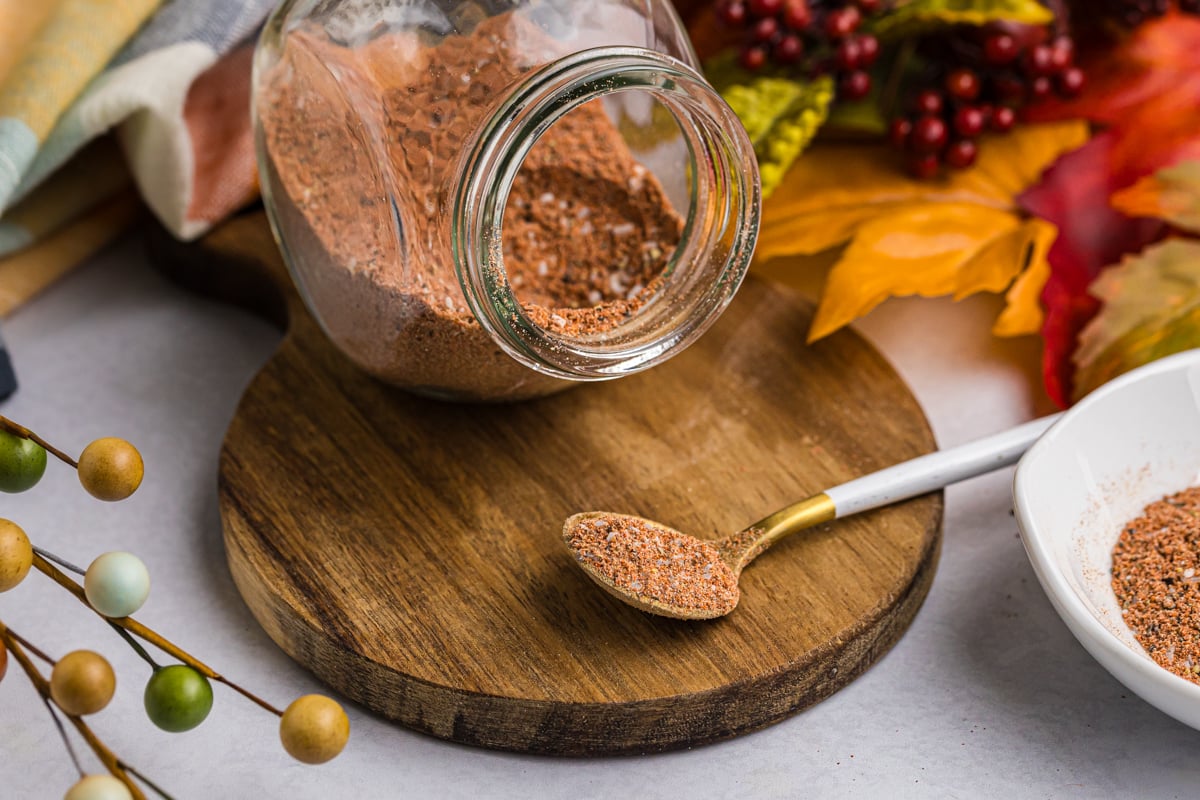
Asking yourself exactly what those turkey rub ingredients are that you have in the pantry, here ya go! Ingredients can run the gamut in variety and amount. Some of the most popular seasoning ingredients include:
- Coarse Kosher Salt- Salt is the magic that makes any bird juicy and flavorful. It seems like a lot, but honestly, you could go heavier and still not feel oversalted. Coarse kosher salt is less salty than table salt. I like using Diamond Crystal, which has less sodium and larger crystals than Mortons. If using Morton’s dial it back by 25%. If using a fine sea salt, reduce by a little more than 50%.
- Chili Powder- Chili powder is a blend of dried chiles that was meant to season chili the stew, but in a recipe like this the mild pepper flavors and hint of spice balance with the salt and other savory items. It will not be spicy- it is just enough to provide flavor, not heat.
- Paprika– Smoked paprika or sweet paprika can be used. I prefer smoked. Neither of these are spicy, but if heat if what you are aiming for, feel free to use hot paprika.
- Ground Black Pepper- Freshly ground black pepper will provide the most robust punch. White pepper is slightly milder. For the most interest and sophistication, grab a peppercorn blend. Freshly grinding also provides the most natural flavor. Bottled ground black pepper can taste a little like sawdust (you didn’t hear that from me…)
- Onion Powder- Onion flavor without a whole onion. It is dehydrated and ground onion.
- Garlic Powder- Same goes for garlic powder. I like using powder here because it won’t burn like fresh garlic would at the heat and length it takes to roast a bird.
- Cayenne– This is spicy and optional, but in such trace amounts that even your pickiest of eaters won’t detect it as heat. Even my 2-year-old eats this rub.
Even with this recipe, it is forgiving, so you can measure exactly or eyeball it. I used to add 1-2 tablespoons of brown sugar to the mix as well.
This hint of sugar and molasses is divine for making a nice crust on a roasted turkey or smoked turkey, but tends to burn and make a lot of smoke on a fried turkey so we took it out to make the recipe better for any preparation.
